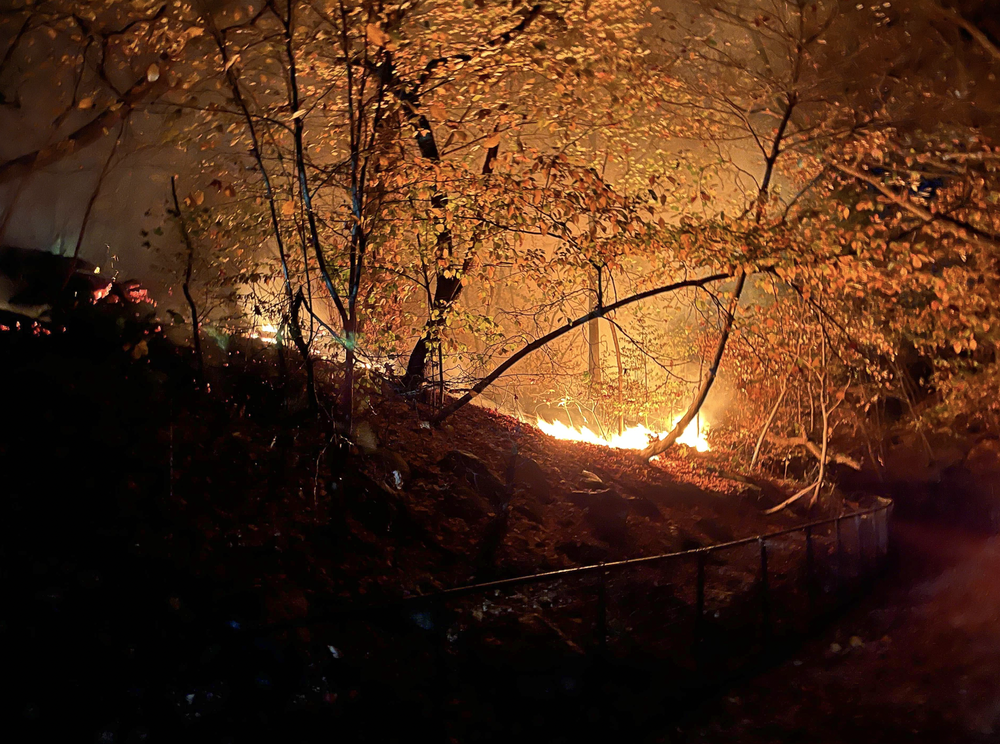After NYC's parks burned last year, Council OKs a plan for wildfires
May 1, 2025, 9:31 a.m.
The City Council voted on a bill requiring parks officials to produce a mitigation strategy.

As wildfires become more common due to climate change, New York City lawmakers are considering how to ensure the city is prepared for fires that break out within its 30,000 acres of parkland.
The City Council Thursday approved a bill requiring parks officials to come up with a strategic plan to mitigate wildfires. The move follows last fall’s historic dry spell, which led to a record-breaking number of brush fires citywide.
"We have to take every step we can as a city to be prepared to take the measures to protect our parkland, our trees, our forests, our green spaces, from the lasting and damaging effects of the wildfires," the bill's Councilmember Shekar Krishnan of Queens said ahead of the Council meeting.
The bill calls on the Department of Parks and Recreation to work with the FDNY to develop procedures for fighting fires and limiting their risks. The plan would have to be completed by next March and be updated regularly. The parks department would also be required to report annually on brush fires in parks.
City parkland makes up about 14% of the city’s total land area, according to the Council. The FDNY said it responded to more than 270 brush fires in the first two weeks of last November, the highest number ever in such a short time. Research shows wildfire smoke harms air quality and can exacerbate health issues like asthma, respiratory infections and heart attacks.
“We’ve been fighting brush fires for a long time, but the nature and extent of the fires last fall indicates a new level of threat,” FDNY Chief of Department John Esposito testified at a Council hearing on the proposal in January. “Whereas most fires in previous years were small and relatively easy to contain, some of the fires in 2024 grew quite large very quickly.”
He added that while no one was killed and no major commercial property was damaged, the brush fires’ location on hilltops and in thickly wooded areas made them difficult to extinguish.
The blazes burned trees and brush in some of the city’s most heavily used green spaces, including Van Cortlandt, Prospect, Highbridge and Alley Pond parks. Officials said a 4-acre brush fire in Inwood Hill Park necessitated 140 firefighters and emergency medical personnel, as well as the use of water from the Harlem River since there were no fire hydrants nearby.
Smoke tinged the air during those weeks, and the FDNY was on high alert. Mayor Eric Adams temporarily banned outdoor grilling, open flames and fireworks. Officials urged New Yorkers to stay vigilant, and the fire department created a wildfire task force. Most uncontrolled fires in city parks start in trash cans, bathrooms or on benches, city data shows.
Marit Larson, assistant commissioner at the parks department, told councilmembers at the January hearing that the agency “appreciate[d]” the bill’s intent and would work with the Council and FDNY on minimizing brush fires through legislation or otherwise. Larson said that in the fall, parks workers helped remove tree hazards after the fires were put out, and calculated more than 41 out of 6,800 acres of forested natural areas had been affected.
“The largest fires occurred in 10 different parks in four boroughs on 13 different dates from mid-October through mid-November,” she said. “This was the most significant set of brush fires impacting forested parkland dating back decades.”
Krishnan, who chairs the City Council’s parks committee, said his bill would facilitate wildfire-related communication, training and monitoring among officials and residents. It would also help authorities tamp down on activities that could start blazes, he said.
The legislation had eight co-sponsors.
Includes reporting by Catalina Gonella. This story has been updated with more information and to reflect the Council's vote.
Wildfire smoke from New Jersey may affect NYC air quality, officials say Wildfires in NYC and NJ have hurt air quality. Here’s how to cope. Fires in NYC parks are common. The drought is making them bigger and more frequent.